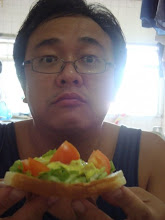CNA featured this report with a video of my work place and student
My 3 seconds of fame is found here
RP teachers conduct e-lessons to minimise spread of H1N1 virus
By Valarie Tan, Channel NewsAsia | Posted: 26 June 2009 2300 hrs
SINGAPORE: It is the second day of home-based e-learning for some 4,600 students at Republic Polytechnic (RP).
The poly said while attendance has been comparable to that at physical classes, it does have to remind affected students to stay at home to minimise possible spread of the virus.
On Friday, eight new cases have been confirmed at the poly, bringing the total to 20.
RP said its H1N1 crisis management centre will remain operational round-the-clock over the weekend.
Staff and students are also required to take their temperature twice daily and declare it online on weekdays.
Teachers at RP have been conducting lessons with their first-year students since home-based e-learning started on Thursday.
The teachers, also known as facilitators in RP, have to engage an average of 25 students online at one time. Lessons are held from 8.30am to 3.30pm in three different sessions with breaks in between.
Students are required to submit assignments everyday. The poly said students' attendance has not been drastically different from that at physical classes.
Vicky Wong, facilitator, Republic Poly, said: "Most of the time, we see 23 students actually logging on to download resources and we have something like 18, or 19 actively engaging in discussion with us."
While the poly cannot force all affected students to study from home, it has reminded them to be socially responsible.
Ms Wong added: "I had a team this morning saying they want to go to Starbucks. I told them 'What if you pass it on to your friends? You don't know now whether you're a carrier of the virus. You just have to be socially responsible. It's not just about you and you being sick anymore, it's about you working with others in your environment.' And after that they kind of agreed, and didn't go."
"The good thing about our interaction with students is that most of the time, we're actually quite close to them. Because we have very small classes, we do enjoy close relationships with students. Sometimes, they do try to tell us things and we try to warn them."
Affected students said they try to abide by the rules.
Ian Immanuel Rodriguez, first-year student, Republic Polytechnic, said: "I try to stay at home and I just go out to grab some food whenever needed. But most of the time, I try to stay at home."
The experience has thrown up some pleasant surprises. Facilitators said quieter students who were shy to speak up in class turned out to be more expressive online. And some students even found ways to do group work without meeting face-to-face.
Sociologist Pauline Tay Straughan said the SARS experience has taught Singaporeans to take virus precautions seriously. But schools and companies need to be flexible when affected students and workers are required to take leave.
She said: "There's a limited extent to how far you can isolate yourself because we live in such a dense city state. So in that kind of social setting, inevitably we let our guard down because we have to go on with daily life.
"To encourage people to be honest, to abide by a self-policing kind of norm, I think that employers, for example, need to continue to exercise flexibility. If there's a way around this, everybody will try their best. It's only when they're pushed into a corner, where there's no other option for them, then they lie."
She added the Health Ministry's calm advisory approach so far, instead of imposing statutory requirements on affected cases has also helped the public remain civic-minded. - CNA/vm
Collectives
12 years ago

No comments:
Post a Comment